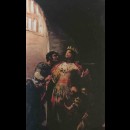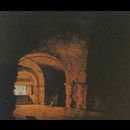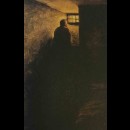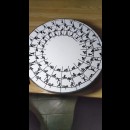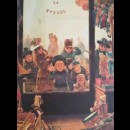The Holy Sonnet "Death be not proud" was written by poet John Donne in 1617. It is an apostrophe to Death, which the author refers to as it were a person standing in front of him.
The sonnet is Shakespearean, as it consists of four sections: three quatrains and a couplet. The rhyme scheme is ABBA in the first two quatrains, CDDC in the third, while the couplet does not rhyme. There are many rhetorical figures in the sound of the poem, like the alliteration of the sounds "th" and "s" in the third verse.
The most important rhetorical device, however, is the personification of death: when the poet refers to it, the word Death has capital letter and in nearly every verse the words "thee", "thou" or "thy" are present, as the poet is talking to death face to face, like it were an arrogant person whom he wants to reproach. Death has characteristics that people may have: it is proud, it thinks, it is pitiful («poor Death»), people go «with it», it is a «slave», it strokes, swells and even dies.
In the first quatrain the poet's opinion about Death is already clear: it is not as terrible as everybody pictures it, on the contrary, he pities it because he must dishearten it. Death feels powerful because it thinks controls us, but is does not even do what it is supposed to do, that is to kill us.
Secondly, death is presented as a good thing, because it provides «much pleasure»: if rest and sleep are its pictures, then it must be even better.
The third quatrain deprives death of an importance and a power of its own, because it is «slave» to fate and human events.
It does not even have a state of its own because it "lives" in «poison, war and sickness». It must not «swell», as earthily poppy and human charms have the same effect of it, that is sleep.
The couplet sums up the argument of the sonnet: our life on Earth is like «one short sleep», after which we live a new eternal life, so that death can affect us no longer. The very last sentence, «Death, thou shalt die», is a paradox: it means that in the end death does not exist, because it is only the passage into a new life.
